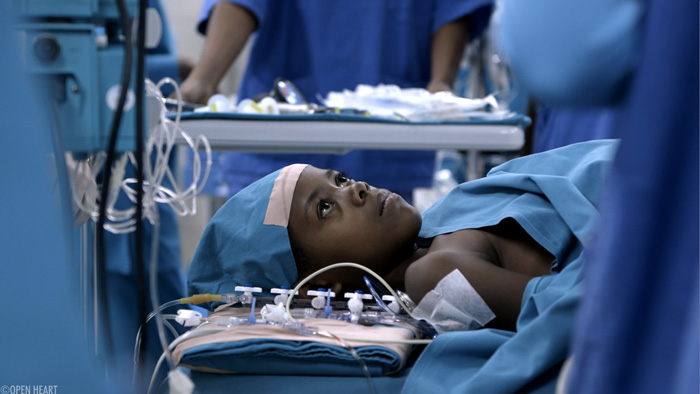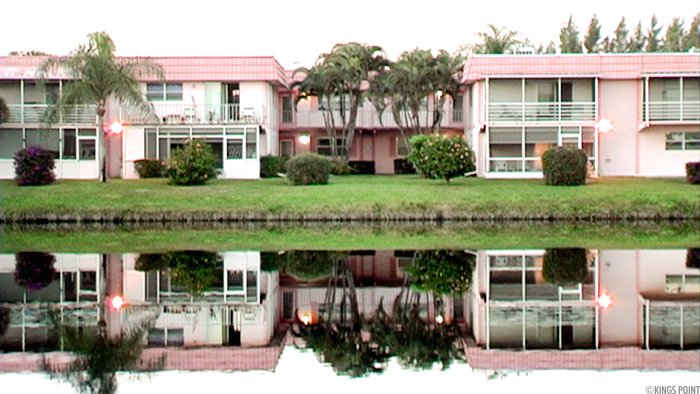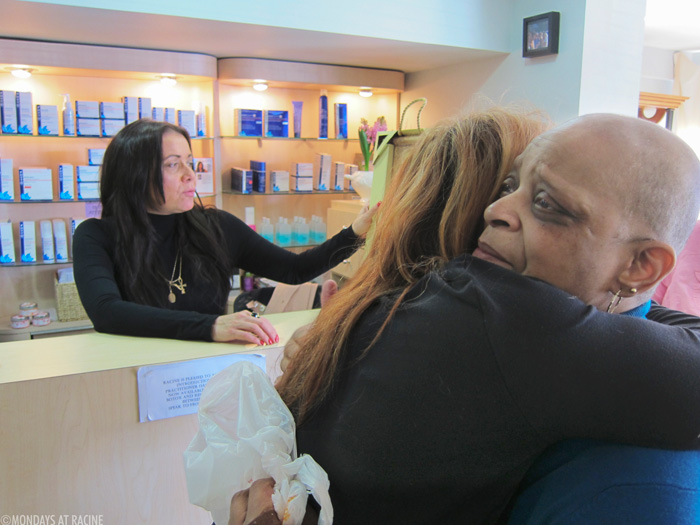
Inocente – USA – 40 minutes
To look at fifteen-year old Inocente is to see a colorful young girl with a permanent smile possessed by infinite possibilities ahead. Confident and carefree enough to paint her face each morning before school with curved flourishes descending past her cheeks and stickered jewels surrounding her eyes, she emits a contagious vitality many strive and fail to acquire. Through her painting and artwork she breathes life into the fun dreams keeping her from falling off the deep end of an emotional abyss. To her anything is possible as long as she’s willing to fight. This is her time to shine and become the woman everyone around her believes she can be.
Appearances are very deceiving, however, in directors Sean Fine and Andrea Nix‘s film. Garnering them their second Oscar nomination for Documentary Short, they’ve chosen a girl who was born for the spotlight and who has a bottomless wealth of creativity to match the expansive imagination inside her brain. But while her smile is genuine and her ambitions possible, the fact that she is homeless will ultimately trump everything else. Inocente’s bravery in the face of adversity is her greatest work of art, turning lemons into lemonade as it were so that she can continue living despite the unbelievable things she has had to endure thus far through her short life.
Suicide is not a foreign concept for Inocente, nor is the unwavering guilt felt about her role in seeing an abusive father deported and a mother and two brothers left alone to jump shelter to shelter in perpetuity. She knows the darkness that comes from a nightmarish past and yet tries her best to refuse to let it define her. She has found San Diego’s A.R.T.S. (A Reason to Survive) program, worked her butt off to be one of two selected from 5,000 for a solo show, and continues to do her best to keep her family together despite so much baggage between she and her mother.
One in forty-five kids are currently homeless in the United States—it’s a staggering figure. Fine and Nix’s portrait of this young girl lets us idolize her perseverance and dedication in not becoming just another statistic. An intimate portrayal allowing its subject to tell her story unfiltered—even putting a camera on her brushes as they dance along the canvas—Inocente stands strong in the knowledge all her dreams will come true.
A-

Open Heart – Rwanda – 40 minutes
Director Kief Davidson‘s Oscar nominated documentary short Open Heart is a complicated film. What on the surface shows the journey of eight Rwandan children to the only free cardiac hospital in Africa ends up transforming into a commercial for the non-governmental organization Emergency at its center. This is admittedly a generalization on my part, yes, but one I don’t think can be ignored. No disrespect to Angelique, Marie, Joas, Bruce, Claire, Francine, Louise, or Dorianne, but their plight has kind of been hijacked to service the work of a hospital in dire financial straits. It’s a tough situation and Emergency’s Salam Center is doing honorable, amazing things, but a very fine line is being toed.
What starts with Dr. Emmanuel Rusingiza—one of Rwanda’s two cardiologists—explaining the prevalence of rheumatic heart disease in African children due to a penicillin shortage quickly turns into an underdog fight for charismatic kids about to fly 2,500 miles from home for a chance at a future. There isn’t money for family to accompany them or enough to send back the bodies of any who may succumb to the physical stress of surgery. Only a hope and a prayer can keep them company besides Rusingiza’s optimistic disposition traveling for support and to keep his relationship with the hospital alive so he can continue sending patients in need.
Open Heart is at its best when showing little Angelique bravely give blood, smile as she is goes under anesthesia, and glow at the sight of her father via Skype post-surgery. She and the older Marie become marked as leads early on—both extreme cases wherein Emergency founder Dr. Gino Strada admits a certain degree of pessimism for full recovery. Watching the children rally around themselves with three-year old Bruno even finding the energy to dance a bit is a wonderful depiction of faith, kinship, and love. Theirs is a human story worthy of sharing with the world. It’s an against-all-odds miracle in the making made more poignant by showing its effect on the patients, families, and doctors involved.
Why then must it be ruined by the heartstring tug for charity? There is too much politics on display—seating us at a board meeting where Strada asks Sudan’s president Omar al-Bashir for the financial assistance he promised doing nothing but trivializing the work being accomplished. We just watched open-heart surgery performed on a six-year old girl and instead of sticking with her recovery and that of her friends we are instead forced to sympathize with the establishment that provided the service. I hoped I’d be saying, “Wow, Emergency is worth every penny private investors give it”. Instead I just heard the film declare, “We just saved eight kids for free and are getting screwed by the Sudanese government. Please help.”
I guess that’s what documentaries are for, though. They show us an issue we wouldn’t otherwise know in hopes to educate. It’s just unfortunate my thanks for clarity on the subject at the start turned into anger once I felt manipulated by exploited kids. I’m not saying this was Davidson’s intent nor that Emergency had a hand in shaping his message—it’s simply my reaction to a depiction of an otherwise miracle of charitable souls trying their best to make the world a better place.
C+

Kings Point – USA – 30 minutes
It was always the stereotypical retirement locale—Florida beckoning with open arms. Great weather, a new community of age-appropriate friends, and a simpler life away from the harsh cold of northern winters awaited everyone who migrated down. Some had to move due to doctor’s orders, others wanted to let their children have their own lives. To move south was to be reborn as a newly single soul on the prowl or as a couple transitioning into their so-called “golden years”. But like all good things, an end must still come. This time, however, your next step takes you to the afterlife.
Kings Point is a short documentary directed by a filmmaker who dedicated the work to her own family member Ira whom I’m sure she visited often. Sari Gilman takes us inside the retirement community to find out exactly how the elderly transplants live so far from the lives they once led. We meet Gert enjoying her solitude with Mahjong chums; Frank and his need for companionship whether knowing the person he’s with is the ‘one’ for him or not; Bea and Jane welcoming the opportunity to drape themselves on his arms for different reasons and with different forms of love; and Mollie‘s matter-of-fact honesty in cutting through facades and realizing staying home may have been a better choice.
Equal parts funny and heartbreaking, we watch as a cutthroat lifestyle consumes these otherwise congenial folks and turns them into creatures hell-bent on self-preservation. No one visits their friends in the hospital because they don’t want to join them there. No one wants to see their ‘friend’ talking to another man or woman because they think their relationship is monogamous even though it’s not. No one gets close anymore because time is no longer on his/her side. Life becomes a series of acquaintances you use to satisfy your needs just as they do you for theirs. As the once thriving community becomes sparse and singles-orientated, it truly is survival of the fittest.
Spanning a few years—there is one fast-forward of two years in the middle as well as an epilogue talking about how some passed on three years before the completion of the film—Kings Point is a stunningly candid depiction of a people we’re soon to join. Some take old age as a chance to start fresh and enjoy what life they have left as others use it as an excuse to give up and settle. What was once a paradise to these kind-hearted souls has become a graveyard and while most have already buried a loved one, very few want to have to do so again.
B

Redemption – USA – 35 minutes
As the economy struggles and paying jobs become few and far between, people need to do whatever is necessary to survive. For many New York City residents, canning is the one thing out there that will ensure they have at least a few dollars by the end of the day. Some of these cart pushers are homeless, some immigrants, and some even war veterans without the ability to find work after factories and/or restaurants employing them have closed. One woman—Susan—was even the recipient of a prestigious IBM Award back in 1990. Unable to survive on social security alone, she hits the streets.
Directed by Jon Alpert and Matthew O’Neill, Redemption is the duo’s second Oscar nomination after China’s Unnatural Disaster: The Tears of Sichuan Province in 2009. Following a slew of canners from all corners of the world now co-existing in New York, the two try to tackle the hows and whys bringing them all to this point. Charismatic characters like Walter and Cuban Joe try to put a positive spin on their work, Susan shows us the utilitarianism of it all with a Chinese rival, and Nuve explains how the bottle and cans have kept her two children, sister, and nephews from going hungry. Canning literally has become a job any and all people can do without the need of resumes or experience.
Sometimes the film’s subjects merely talk at the camera while others engage friends and new acquaintances to shed light on the community. We learn about companions Hassan and Lily meeting in a redemption center; a Guatemalan farmer who grows corn back home and cans to sustain it during the off-season; and perhaps the saddest story of all in Japanese transplant John who hasn’t had a job since his office at the World Trade Center was destroyed. None of them are asking for help, none are ashamed—anymore—of what they do. They aren’t sitting in front of swanky restaurants with out-stretched hands. No, even without the ability to find conventional work, they created a job just the same.
Alpert and O’Neill have found a fresh voice in the city that may not be what you expect. If you go in thinking about the homeless rabble we like to complain about while quickly hypothesizing how they can fix their situations without the capacity to understand quite how tragic their lives have been you’ll be surprised at how they’ve come to this point. These men and women have put in their time and have played by the rules in a system that simply can’t sustain them anymore. You must respect them trying their best and having the modesty to do it without begging for charity. Life gave them a rough hand and they’ve refused to give up.
B

Mondays at Racine – USA – 39 minutes
Mondays at Racine is a very worthwhile story touching upon the myriad points on life’s spectrum by branching off from its simple subject towards the much more personal and powerful realities facing cancer patients across the world. Oscar-winning—her documentary short Freeheld—director Cynthia Wade probably began her journey into Rachel Delmolfetto and her sister Cynthia Sansone‘s lives without any clue as to what she would discover next. The film may retain a title speaking towards the compassionate service these siblings give to a community of women on Long Island, but its spotlight on two specific ladies is what makes it so memorable.
The amazingly selfless idea of opening Racine Salon de Beauté & Spa once a month to women dealing with hair loss from chemotherapy introduced Wade to the lives of so many struggling to cope with their changing identities. Rachel and Cynthia’s own mother was diagnosed years before and it was watching her attempts to live through the chaos that sparked this concept and has helped so many like her adjust. They will hold their customers’ hands while the hair comes off, lead talking sessions for everyone to speak their mind and help one another prevail, and truly go out of their way to make this one side effect of their therapy become more manageable.
Their story is newsworthy and hearing them admit what they do is to a certain point selfish because of karmic retribution and the knowledge they don’t have it quite so bad after all, Wade brilliantly takes Mondays at Racine away from the beauty parlor and into the homes of its clients. Many women and their spouses pop up throughout the film in candid interview snippets that help explain what it is to live with cancer, but it’s Linda Hart and Cambria Russell who allow the sort of unfettered access that could seem overly obtrusive considering where their lives go in one short year. The resulting bravery and the willingness to show it for others to understand and not be so afraid is wonderful.
The movie could easily have fallen prey to self-promotion—Racine’s storefront sign is shown quite a bit. Thankfully the transparency of Linda and Cambria allows it to be more. We’re talking about the physical pain of chemotherapy and the emotional strain it takes when mastectomies and shaved heads infiltrate lives in larger ways than just aesthetically. We see hard choices made, watch as a little boy’s future hangs in the balance of his would-be adoptive mother’s mortality, and witness the exception that proves the rule in terms of life expectancy statistics. It’s a film full of tears and yet never shies away from the abundance of optimism possible if you can surround yourself with those who love and cherish you no matter what.
A-
The Oscar Nominated Shorts are now showing in limited theatrical release.

